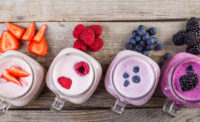Functional ingredients support immune, brain and digestive health
Immune health will continue to drive food and beverage purchases in 2022.

The emergence of new coronavirus strains will keep immune health top of mind in 2022. Dairy foods, both sweet and savory, are a versatile base for functional ingredients that support immune health, as well as brain health and digestive health. Probiotics, which support all three of those health categories, will be discussed in my May column. Let’s explore some familiar and emerging functional ingredients.
Vitamin D and immune health
In its 2021 global consumer survey, Kerry found that 58% of respondents identified immune support as a compelling purchase factor. And according to Glanbia Nutritionals, the most in-demand ingredients for immune support are vitamin C, vitamin D, zinc, probiotics, and adaptogens such as echinacea, turmeric, and ginger. Vitamin D is found naturally in full-fat dairy.
Scientists now believe that vitamin D acts directly on immune cells, which play a key role in autoimmune diseases. A 2020 paper in Nutrients (“Vitamin D’s Effect on Immune Function”) outlines the importance of vitamin D in the regulation of both the innate and adaptive immune system, as demonstrated by the discovery of the presence of vitamin D receptor expression in almost all cells of the immune system.
Another 2020 Nutrients paper (“The Effects of Vitamin D on Immune System and Inflammatory Diseases”) clarified that vitamin D deficiency is related to a higher risk of cardiovascular, infectious, and autoinflammatory diseases. Numerous observational studies have demonstrated that serum vitamin D levels are inversely correlated with the incidence and severity of COVID-19, too.
Milk is the No. 1 food source of vitamin D in the American diet. Virtually all milk, as well as some yogurts and cheese, are fortified with vitamin D. A serving of Lifeway kefir contains 25% of the Daily Value for vitamin D, and the product carries the claims “Rich in Calcium and Vitamin D” and “May Support a Healthy Immune System.”
Choline and brain health
We typically think of brain health as an issue for seniors. But good brain health starts in utero and continues with important nutrients for brain development in babies and young children. Early childhood is a time of rapid brain development, and choline boots the brain’s ability to grow and function well.
In a 2022 paper (“Prenatal choline supplementation improves child sustained attention: A 7-year follow-up of a randomized controlled feeding trial”), Cornell University researchers confirmed the critical role choline plays in infant cognitive development. This groundbreaking new research shows that pregnant women who took more than twice the recommended dose of choline during pregnancy had children that demonstrated significant cognitive benefits through early childhood. Choline has also been linked to better cognitive performance in older adults.
Developed by pediatricians, Horizon Organic Growing Years line starts with organic whole milk and adds prebiotics, DHA omega-3, and choline. In 2021, the line was expanded to include yogurt pouches and cultured dairy smoothies.
Acacia gum and gut health
A growing body of research indicates that gut health plays a critical role in overall health and that gut health has a strong relationship to immunity. Dietary fiber is a nutrient of concern, as most American’s don’t consume the recommended Daily Value of 25 grams.
In December 2021, FDA approved the dietary fiber status of acacia gum. Acacia fiber is unique in that is ferments slowly. The evolution of acacia fiber content during the shelf life of dairy products containing live lactic bacteria is very small compared to other fibers.
“Acacia fiber is a natural ingredient mostly used in the dairy industry as a prebiotic fiber, but also to provide specific textures to dairy products such as yogurts, creams, and milks,” says Violaine Fauvarque, marketing manager, Alland & Robert. “Acacia fiber is an excellent fiber alternative in dairy products as it provides resistance to acidity and heat. It has no side effect, a neutral taste with very low viscosity, and a low caloric value that is ideal for dietary use. In addition, acacia fiber has a positive effect on rheology and a pH compatible with milk proteins, which makes acacia fiber ideal for the formulation of dairy products.”
In their recently released 10th annual survey (“What’s Trending in Nutrition”), Pollock Communications and Today’s Dietitian say Registered Dietitian Nutritionists predict that the top purchase drivers of 2022 will be foods and beverages that not only support immunity but also are affordable and promote comfort and wellbeing.
Sharon Gerdes is a Certified Food Scientist and author who writes extensively about dairy’s role in health and wellness. Learn more at http://sharongerdes.com.
Looking for a reprint of this article?
From high-res PDFs to custom plaques, order your copy today!






